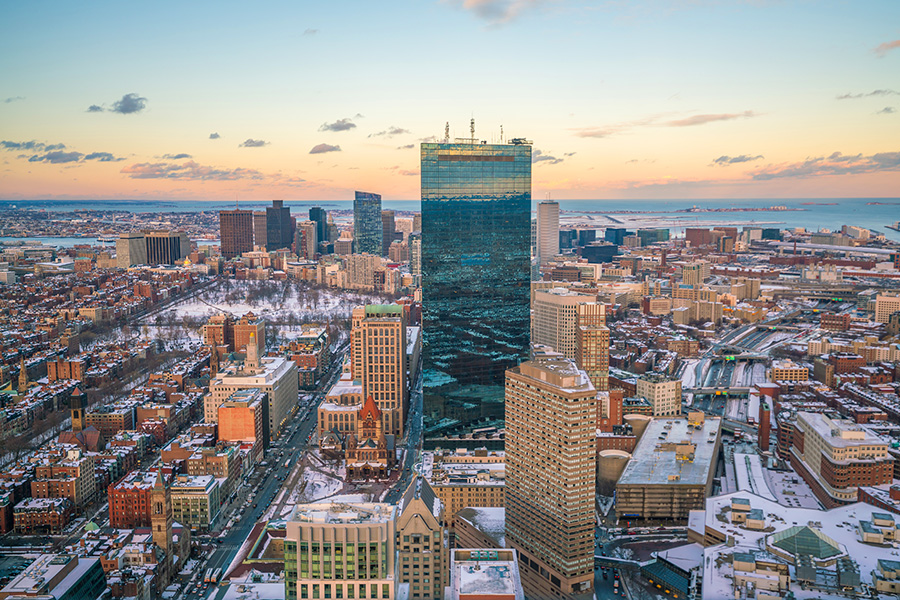Why Isn’t Boston’s Housing Market Slowing Down?
While most industries have closed for business in the midst of the COVID-19 pandemic, Boston's real estate industry is operating business as usual.

Photo via Getty Images
As we’ve all been advised to hunker down where we are, going out and buying a new house isn’t front of mind for most of us. And yet, local real estate agents say, the housing market rages on. “People are still coming out in droves wanting to see properties, and some of my busiest buyer’s agents are still super busy,” says Compass sales manager Chris Thoman.
It’s hard to reconcile a relatively thriving housing market with a city that all but has tumbleweeds rolling through the streets. So how is real estate essentially continuing with business as usual, while most other industries are closed for business? For one, interest rates are incredibly low. Two weeks ago, the rates for a 30-year fixed-rate mortgage dropped to 3.29%, hitting an all-time low. This week, they quickly rose to 3.65%, but that’s still significantly lower than the 4.28% from the same week last year.
These discounted rates translate to game-changing savings for buyers, Thoman points out. “Someone who could’ve afford an $800,000 condo in South Boston, for example, with the interest rates dropped, could now afford potentially $900,000 or even $1 million.” The chance to trade up for a nicer place, or lock down a piece of real estate at all, is apparently enough to lure many Bostonians out of their homes.
The other piece of the equation is that by the time the COVID-19 situation became state-of-emergency-level serious in Massachusetts, the housing market was already off to a strong start. Thanks in part to the winter that never was, the spring market kicked off around early February, and there’s all of this inventory to be snatched up. “There was a lot of properties that hit the market 30-45 days earlier than they normally would have, so there’ve been a lot of properties that have gone under agreement,” says Thoman.
Some agents had seen some instances of deals falling through, though. Reasons included the seller being a doctor who wouldn’t be available for the foreseeable future, the buyer getting laid off of their job and needing to be cautious with spending, the seller not wanting showings to come through their home, and the buyer living internationally and putting off the purchase. But people are finding reasons why now is a better time to buy or sell than any, and sometimes it is due to the coronavirus crisis. For instance, some buyers are feeling motivated by those low interest rates, some want to move their wealth from the stock market into real estate for increased security, and others are anxious to buy quickly because they fear the limiting possibility of a lockdown.
While the driving forces may be different, the market is moving similarly to this time last year. From March 16 to March 20 in 2019, Thoman says 97 listings “went pending,” or accepted offers. Compare that to the same date frame in 2020, when 86 listings changed status to pending. “It’s not a lot in the grand scheme of things,” he says.
It’s not all old inventory that’s being bought up, either. Amy Mizner, a Gibson Sotheby’s agent who operates mostly in MetroWest, says just in the last two days, eight listings came on the market in Sudbury, six in Needham, four in Weston, and three in Wellesley. “So when you’re seeing business as usual, there are still people putting brand new listings on the market,” she says.
While an unfaltering housing market is encouraging to many realtors, some worry that it means the industry isn’t taking the pandemic seriously enough. “Last weekend, many agents that kept their open houses provided an opportunity to wash hands, but not all took social distancing as seriously as they should have,” says Josh Muncey, founder of Jamaica Plain-based agency The Muncey Group. “Realtors are not being safe enough nor providing leadership in their industry to calm people down and try and have people stay home more.” Though many agents are choosing to cancel open houses, and agencies such as Gibson Sotheby’s have put a moratorium on them, listing site Redfin still shows 69 open houses scheduled for this weekend in Boston alone.
But the mayor’s office may force some changes. Per new guidelines sent by Marty Walsh in a letter to realtors March 20, open houses should not be held going forward, and individual showings should include “minimizing contact with others, staying six feet away from others, washing hands frequently, using hand sanitizer and wiping down surfaces touched.
One way agents are assuaging health concerns while still moving deals forward is, like many offices working remotely right now, leaning heavily on technology. Virtual tours, video calls (“I just got off two Zoom meetings,” says Mizner), negotiating over FaceTime, and e-signing purchase papers have all become more commonplace in recent weeks. “The technology is really helping us stay safe, which is exciting,” Mizner says. In fact, Thoman says, he’s even seen a few homes sell over the last couple of days where the buyer purchased the property completely sight unseen, without even a quick walkthrough after vetting and virtual showings. Though not quite with the same popularity, he believes that without a question, many of these tech-driven habits will stick around after the virus subsides—bringing a long overdue update to the traditionally analog process of home buying.
Though the housing market has seen little drop-off in activity so far, it’s hard to say whether it’s only a matter of time before the effects of the pandemic catch up. “The fear that I have, and it’s shared by many, is that the duration of the economic shutdown is so severe that it has a ripple effect and causes a slow down,” says Tom Matthews of Gibson Sotheby’s. “We like to tell people that the real estate economy is like an aircraft carrier, and it moves along and when it needs to change, it takes time.” Is the currently robust market just part of a delayed response?
The way Mizner sees it, the housing market is on somewhat of a pause right now. Many buyers and sellers are moving forward, but on the whole, Boston is waiting to see how long this will all last, and what will happen when things begin again. When the powers that be press play, the real estate market could go a few ways. Mizner, for one, predicts that when those floodgates open, “You’re going to see a feverish market, because it’s a real buying opportunity.” Thoman is of the same mind. “That pent up demand is still going to be there,” he says, and the barrage of new listings that will likely go on the market will attract buyers.
Muncey is less sure, though he believes Boston may be uniquely positioned for a recovery. “Real estate agents will need to adapt quickly. I think the market will slow down across the country, but Boston real estate could be an investment that many seek out because they feel it’s more secure than the stock market.”
For his part, Matthews believes “the market will bounce back just like it does coming out of the winter,” which we never really had this year anyway. But, if this purgatory state of closures and social distancing lasts longer than two or three months, the housing industry may take a hit. “If the duration is longer and there are fewer buyers, if the market is flooded with sellers, or if there is a [drastic] change in interest rates, then you could see the real estate market start to slow,” he says.
If nothing else, Boston’s real estate sector chugging along without falter so far is a testament to just how hot the market truly is.


